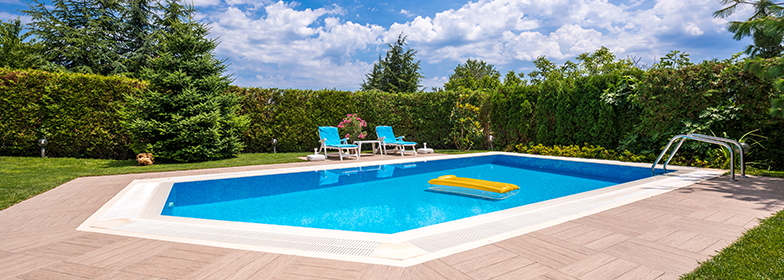
Does a pool add value to your home?
Adding an in-ground pool can boost your home’s value, but it isn’t a one-size-fits all solution, and can easily turn into an expensive, time- (and space)-consuming nuisance. A pool can add value if you live in a warmer state, your neighbors have them and you can afford the maintenance, but there’s more to consider than aesthetics and family fun. Let’s dive into the reasons why a pool could be a valuable addition or a draining mistake.
Can you afford the maintenance of a pool?
When you’re adding a pool, installation costs aren’t the only factor for your budget— keeping your pool in tip-top shape has a monthly and annual expense.
Here are some common monthly maintenance tasks and average costs per HomeGuide all of which can range from $50-$200/month depending on whether the pool is vinyl-lined, concrete or fiberglass:
- Water analysis and chemical balancing
- Backwash filter
- Cleaning skimmer and pump baskets
- Cleaning auto pool clean bag
- Brushing pool walls
- Skimming
- Vacuuming
- Winterizing (seasonal)
- Re-opening the pool for spring (seasonal)
Annually, these monthly maintenance costs plus additional upkeep for chemicals, electricity, water and seasonal open and closing can total between $3,000-$6,000.
Still, research suggests an in-ground pool can increase your home’s worth by 7%; that figure greatly varies depending on where you live. The National Association of Realtors’ Remodeling Impact Report for 2023 even suggests a 56% increase in ROI.
On the flip side, if you decide to sell your home and have an unkempt, worn-out pool, that could have a negative effect. The thought of expensive repairs plus maintenance can be off-putting.
Do you live in a sunny climate?
Buyers want to enjoy leisurely outdoor activities if the home is in a sunshine state. In those locations, a pool would be advantageous and make your home more marketable. Your home will be more competitively priced with a pool if you live in:
- Arizona
- Florida
- California
- Texas
- Nevada
Because states like California are so large and have micro-climates, the financial benefit of a pool could vary greatly by city.
Do your neighbors have pools?
If your home’s the only one in the neighborhood without a pool, that could actually decrease your home value. This especially applies to the cities among the states listed above.
In comparing similar homes to yours, an appraiser could issue a lower market value if your home doesn’t have a pool while others do. It’s a great idea to consult with an appraiser to get your home’s value before and after a proposed pool installation project.
Does the cost to build outweigh the potential value?
In 2025, building an average in-ground pool in the U.S. will cost around $65,000. This will all depend on the size of your pool, labor and material costs in your area, and any special features you want to incorporate like a waterfall or specific lighting. If you’re meeting with an appraiser and your home value looks like it won’t go up more than the cost of building the pool, it won’t be a very cost-effective project.
Not to mention your water and electricity bills will jump. This will depend on the pump and heater you use, but simple maintenance will inevitably use up your water. Prepare for that price increase.
There are other potential costs, like:
- Higher insurance premiums, because of higher liability
- Potential repairs or replacements
- Maintaining PH
- Saltwater pool maintenance, while more skin-friendly, requires a specialized protocol
There are different ways to finance pool construction, whether that’s with a HELOC or HELOAN, a renovation loan or a credit card. Your interest rate will likely be the most important deciding factor.
Is your yard big enough?
If your yard is barely big enough for a pool, that’s likely going to turn away buyers because there’s not much space for anything else, let alone walking.
Plus, excess pool water can negatively damage the plants and landscaping around it. Whether it’s too much chlorine or excessive salt, damage to your landscaping can bring your home’s value down, adding another cost for you to repair.
What if I want to buy a home with a pool?
While it’s true you won’t have to consider construction costs if you’re already buying a home with a pool, all other costs must still be considered. If you want your pool to stay valuable, you’ll have to budget a few hundred every month—or a few thousand a year—to maintain its excellence. Brace yourself for not only maintenance expenses, but also weekly time spent inspecting your pool for any hazards or potential issues.
Overall, there’s no specific answer to whether a pool would increase your home’s value. You’ll have to consider maintenance costs, your location and climate, size, and even your neighbors’ own homes. If you’re convinced and ready to start building, reach out to one of our loan officers to see how we can help you finance your warm-weather oasis.
The above information is for educational purposes only. All information, loan programs & interest rates are subject to change without notice. All loans subject to underwriter approval. Terms and conditions apply. Always consult an accountant or tax advisor for full eligibility requirements on tax deduction.
